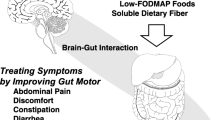Abstract
Background
Nutritional counseling for gastroparesis focuses on reduction of meal size, fiber, and fat to control symptoms. The tolerance of gastroparesis patients for particular foods is largely anecdotal. The aim of this study was to identify and characterize foods provoking or alleviating gastroparesis symptoms.
Methods
Gastroparesis patients completed: (1) Demographic Questionnaire; (2) Patient Assessment of Upper GI Symptoms; (3) Food Toleration and Aversion survey asking patients about experiences when eating certain foods utilizing a scale from −3 (greatly worsening symptoms) to +3 (greatly improving symptoms). Descriptive qualities (acidic, fatty, spicy, roughage-based, bitter, salty, bland, and sweet) were assigned to foods.
Results
Forty-five gastroparesis patients participated (39 idiopathic gastroparesis). Foods worsening symptoms included: orange juice, fried chicken, cabbage, oranges, sausage, pizza, peppers, onions, tomato juice, lettuce, coffee, salsa, broccoli, bacon, and roast beef. Saltine crackers, jello, and graham crackers moderately improved symptoms. Twelve additional foods were tolerated by patients (not provoking symptoms): ginger ale, gluten-free foods, tea, sweet potatoes, pretzels, white fish, clear soup, salmon, potatoes, white rice, popsicles, and applesauce. Foods provoking symptoms were generally fatty, acidic, spicy, and roughage-based. The foods shown to be tolerable were generally bland, sweet, salty, and starchy.
Conclusions
This study identified specific foods that worsen as well as foods that may help alleviate symptoms of gastroparesis. Foods that provoked symptoms differed in quality from foods that alleviated symptoms or were tolerable. The results of this study illustrate specific examples of foods that aggravate or improve symptoms and provide suggestions for a gastroparesis diet.
Similar content being viewed by others
References
Parkman HP, Hasler WL, Fisher RS. American Gastroenterological Association technical review on the diagnosis and treatment of gastroparesis. Gastroenterology. 2004;127:1592–1622.
Soykan I, Sivri B, Sarosiek I, et al. Demography, clinical characteristics, psychological and abuse profiles, treatment and long-term follow-up of patients with gastroparesis. Dig Dis Sci. 1998;43:2398–2404.
Patrick A, Epstein O. Review article: gastroparesis. Aliment Pharmacol Ther. 2008;27:724–749.
Parrish CR. Nutrition concerns for the patient with gastroparesis. Curr Gastroenterol Rep. 2007;9:295–302.
Parkman HP, Yates KP, Hasler WL, et al. Dietary intake and nutritional deficiencies in patients with diabetic or idiopathic gastroparesis. Gastroenterology. 2011;141:486–498.
Koch KL. Approach to the patient with nausea and vomiting. In: Yamada T, ed. Textbook of Gasteroenterology. 2nd ed. Philadelphia: JB Lippincott; 1995:731–749.
Jackson, FW. Gastroparesis diet for delayed stomach emptying. Jackson Siegelbaum Gastroenterology. 2011. http://gicare.com/diets/gastroparesis-diet/.
Saltrelli, C. Gastroparesis patient survey June 2010. Living With Gastroparesis. http:/www.livingwithgastroparesis.com/GPSurvey0610.pdf.
Abell TL, Camilleri M, Donohoe K, et al. Consensus recommendations for gastric emptying scintigraphy. a joint report of the society of nuclear medicine and the american neurogastroenterology and motility society. Am J Gastroenterol. 2008;103:753–763.
Rentz AM, Kahrilas P, Stanghellini V, et al. Development and psychometric evaluation of the patient assessment of upper gastrointestinal symptom severity index (PAGI-SYM) in patients with upper gastrointestinal disorders. Qual Life Res. 2004;13:1737–1749.
Revicki DA, Rentz AM, Dubois D, et al. Gastroparesis Cardinal Symptom Index (GCSI): development and validation of a patient reported assessment of severity of gastroparesis symptoms. Qual Life Res. 2004;13:833–844.
USDA National Nutrient Database for Standard Reference. http://ndb.nal.usda.gov/.
Homko C, Duffy F, Friedenberg F, Boden G, Parkman HP. Effect of dietary fat and food consistency on gastroparesis symptoms in patients with gastroparesis. Neurogastroenterol Motility. 2015. doi:10.1111/nmo.12519.
Conflict of interest
None.
Author information
Authors and Affiliations
Corresponding author
Rights and permissions
About this article
Cite this article
Wytiaz, V., Homko, C., Duffy, F. et al. Foods Provoking and Alleviating Symptoms in Gastroparesis: Patient Experiences. Dig Dis Sci 60, 1052–1058 (2015). https://doi.org/10.1007/s10620-015-3651-7
Received:
Accepted:
Published:
Issue Date:
DOI: https://doi.org/10.1007/s10620-015-3651-7




